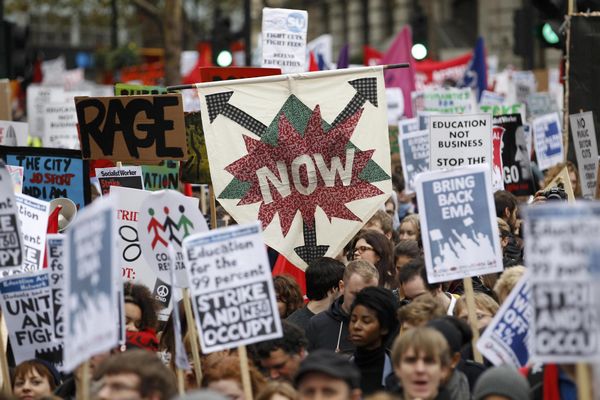London students march against fee rise
Updated: 2011-11-10 07:06
(Agencies)
|
|||||||||||
LONDON - British police arrested 20 people when thousands of students marched through London on Wednesday in the latest display of anger against the Conservative-led government's austerity measures.
 |
|
Demonstrators march through central London November 9, 2011. [Agencies] |
Several of the arrests came after a group of protesters split away from the main route and pitched more than 20 pop-up tents at the base of Nelson's column in Trafalgar Square, mirroring an encampment of protesters over the last month at St Paul's Cathedral.
Seeking to avoid a repeat of the stand-off at St Paul's, police moved into the square and cleared the tents from one of London's most popular tourist spots.
Minor scuffles broke out as police carrying riot helmets funneled protesters on the main march through the streets towards their rallying point in the city's financial district.
Four protests by students late last year led to clashes with police, assaults on public buildings and the Conservative Party's headquarters, and almost 400 arrests.
Up to 10,000 people from across Britain had been expected to join the demonstration against the education policies of the coalition government although initial estimates suggested the figure was lower.
It was the biggest protest in London since the capital and other English cities suffered four days of rioting in August, the worst urban violence for decades.
Protesters held up banners denouncing steep rises in tuition fees. "Education for the 99 percent," read one.
Others echoed the message of London's Occupy encampment outside St Paul's Cathedral, demanding: "Take the wealth off the one percent."
The students are angry at government plans which they argue amount to privatisation of higher education, and last year's decision to hike tuition fees and cut attendance payments for poorer teenagers.
The protests have also taken on a wider agenda to embrace opposition to reform of the welfare state, part of deep austerity measures to help cut a budget deficit which peaked at nearly 11 percent of gross domestic product.
Rising taxes, high inflation and a stagnating economy have hit public confidence and fuelled a sense of discontent with politicians and the financial sector.
As well as students, electricians and taxi drivers were staging protests on Wednesday ahead of a planned nationwide one-day strike on November 30 by public sector workers.
The protest was also the biggest test for London's Metropolitan Police since this summer's riots when it was lambasted by politicians for failing to get a grip on the trouble quickly enough.
This time, in a marked change of tactics, they flooded the route with officers, cordoned off potential flashpoint areas like the London Stock Exchange and deployed police horses from the outset.
As night fell, most of the protesters began to head home, leaving only a small group to dance to a noisy sound system.
Hot Topics
HIV/AIDS, Egypt protest, Thanksgiving, climate change, global economic recovery, home prices, high-speed railways, school bus safety, Libya situation, Weekly photos
Editor's Picks

|

|

|

|

|

|







